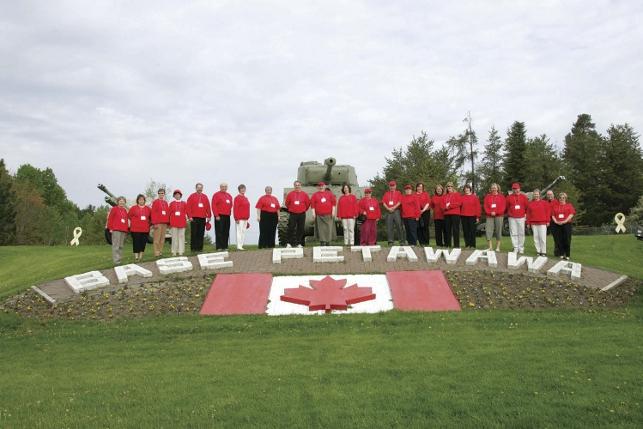
The Challenge of Teaching in an Emotional War Zone
For the average Canadian teacher, the war in Afghanistan seems remote. It is a news story we can turn off and ignore. And we can argue about Canadian participation in this mission with impunity because it has little impact on our daily lives. But for teachers working at schools in and around Canadian military bases, the war is a reality that cannot be ignored, and its impact on their lives and those of their families and students is incalculable.
CFB Petawawa, located in the heart of Renfrew County, is a case in point. It is home to 5,400 military personnel, 45 of them spouses of the 440 teachers and occasional teachers employed by the Renfrew County District School Board. Since the deployment to Afghanistan began in 2005, 20 Petawawa soldiers have been killed and another 80 injured. In a small town of 15,000, such statistics are truly staggering and have far-reaching consequences for the entire community.
Although less than a two-hour drive from Ottawa, CFB Petawawa is light years away in its psychological climate. “I don’t think that the rest of Ontario or Canada has really figured out that we are at war,” observes Renfrew Teacher Local president Alice Paige. “I’m hearing from teachers all the time who are totally stressed and worried about their spouses who have been gone for several months; they’re concerned about how they’re going to manage their own children and go into school every day to do their jobs and face their students who are worrying about their moms and dads currently serving in Afghanistan.”
Project Petawawa
To gain more insight and to provide support for teachers and students in Renfrew, ETFO President Emily Noble and other members of the provincial executive, local leaders and provincial staff, representatives from OSSTF and OECTA, and senior Renfrew County District School Board staff attended briefings at CFB Petawawa in May.
Project Petawawa began with a tour of the military base. Commanding Officer Lt. Col. Dave Rundle provided the group with an overview of the base. He described the mission in Afghanistan and the military support programs that assist soldiers and their families during the deployment and reintegration process. He acknowledged that since November 2005, when the active phase of military engagement began, the number of military families seeking psychological services has jumped more than eight-fold.
Supporting military families
A key component of support for military families is provided by the Petawawa Military Family Resource Centre (PMFRC) situated on the base. It offers a wide range of services for children, youth, and adults, including crisis intervention, childcare, parenting skills instruction, and help with issues related to deployment.
Canadian and American military research on the emotional cycle of deployment has identified seven distinct, recurring emotional stages that can play havoc with family members’ emotional well-being. These include anticipation of loss, detachment and withdrawal, emotional disorganization, recovery, and stabilization. Megan Egerton, a teacher whose husband is currently serving in Afghanistan, explains: “We talk about deployment, but it’s really important to understand that the time extends well beyond the six-month tour of duty.”
Families of members of special task force units may suffer additional trauma, because these soldiers are not allowed to share even the most basic information about their tour of duty.
Reunion can be equally problematical. The anticipation of homecoming is often followed by the need to renegotiate relationships and reintegrate the family. When spouses come home, many different conflicts can occur. According to Egerton, “The reunion period can be difficult because you get into routines and then your husband comes home and wants to take right over again.”
And there is the “What if?” factor. According to Michelle Belec, coordinator of the PMFRC’s school-based deployment pilot project, many families experience a heightened state of anxiety because they fear that their loved ones are not going to come back or may return with serious injuries.
Teaching children in stress
During the town hall meeting organized by the Renfrew locals for ETFO members, the delegation heard firsthand accounts of the stress that teachers working in schools on or near the base experience. The personal and professional challenges they face are daunting.
All agreed that many of the children of military families are in crisis. One mother/teacher described how her youngest daughter refused to speak to her father for two months after his redeployment. “She’s not the same little girl she used to be,” said Velita Richards. “She’s very sad and worried that her dad will be hurt.”
Colleen Finn, a school support counsellor in the Petawawa family of schools, focuses on deployment issues and has firsthand experience with these home-front casualties. She described working with children who refuse to participate in the Red Friday Campaign because for them it evokes images of blood and death.1 Others become terribly upset on special occasions like birthdays and Christmas if a parent is not there to join in the celebrations.
Communication with the absent parent can be equally upsetting, according to Finn. “It’s never a quiet call. There is always lots of noise – helicopters, shouting, and gunfire in the background. It’s really hard, especially if their parents are frontline. There’s also a time lag during the conversation so the child doesn’t get an immediate answer. Some of the kids are so excited with the first few calls that they talk too fast and don’t hear what Dad is saying. That in itself becomes stressful.”
Low EQAO scores in schools on and around the base are an additional source of concern. Several teachers described the frustration of struggling to raise literacy and math levels in an environment where students and staff are subject to daily anxieties related to the war. As one teacher pointed out, educational researchers do not know how stress affects students’ short-term memory and executive function but it seems logical to assume that emotional turmoil might contribute to poor academic performance.
What teachers can do
Many of these teachers are actively engaged in making a difference. Remember those kids whose parents are overseas for such significant events as birthdays and important holidays? Colleen Finn helps to make these occasions meaningful in other ways. “We try to focus on the positive things, even though they may not feel that positive,” she says. Currently, she is working with Care Canada to get local kids involved in a variety of humanitarian projects.
School counsellor Michelle Belec and her colleagues from the PMFRC offer workshops for teachers, attend school staff meetings to discuss deployment issues, and work with children in crisis. “We want to have ongoing contact with principals and teachers whether it be through phone contact, visits, or newsletters going out to the schools throughout the year.”
Megan Egerton has developed a series of curriculum resources on deployment issues. Both practical and imaginative, they cover a wide range of topics and suggested activities. A couple of examples: a schoolwide project enables students to “Walk to Afghanistan” as part of their physical education fitness program; maintaining a “Feelings” graph allows kids to monitor their emotions at school in a supportive atmosphere.
The board’s response
Many teachers say they have been disappointed by the lack of compassion displayed by the Renfrew County District School Board. They spoke of being denied leave to spend time with spouses returning from Afghanistan and of being refused permission to attend memorial services for slain mili- tary personnel.
Recently, the RCDSB has begun to recognize that teaching staff affected by military deployment require special consideration when it comes to leave. According to Renfrew local president Alice Paige, teachers can now successfully apply for this leave.
ETFO takes steps
At the provincial level, ETFO executive members have developed a series of recommendations, several of which deal with collective agreement language that would provide members who have immediate family in active military service access to paid leave.
In addition, ETFO plans to organize a regional conference in co- operation with military personnel and the PMFC during the 2007/2008 school year with a focus on classroom strategies and stress management techniques designed to support members and their students. ETFO also intends to lobby the provincial government to make sure there is adequate funding for services.
“Provincially, I think that we can be doing a lot more,” says Emily Noble. “In school boards where there is trauma, there must be adequate funding for the children and the people who work with them.”
For several years now, in and around Canada’s military bases, teachers, their families, and students have been operating in an emotional war zone that is poorly understood and under-appreciated by those of us not directly involved. Increasing our understanding is one way we can all show our support.
Notes
1 The Red Friday Campaign, was initiated on military bases in the U.S. in 2005 as a way to support the troops. Military wives on Canadian bases picked up on the idea and have promoted it across our country; everyone is asked to wear something red each Friday.

